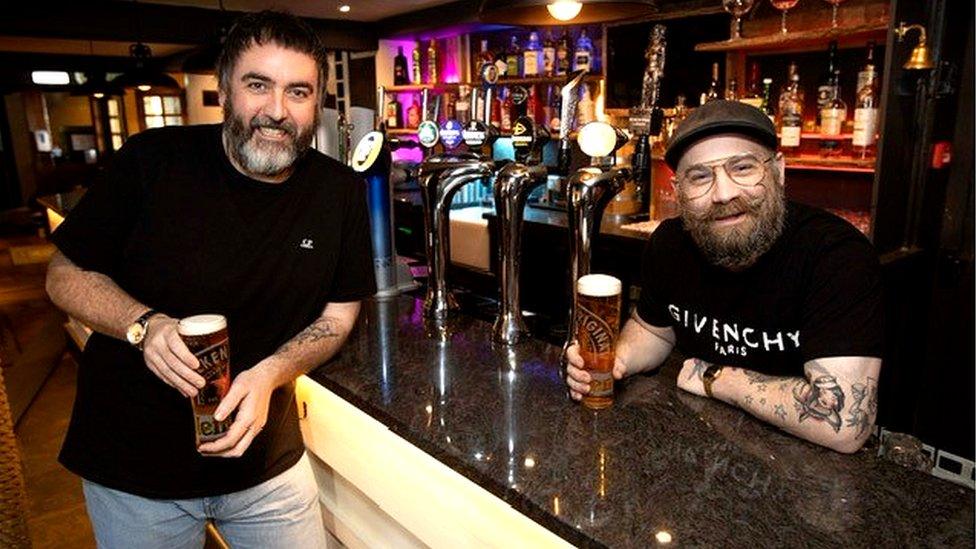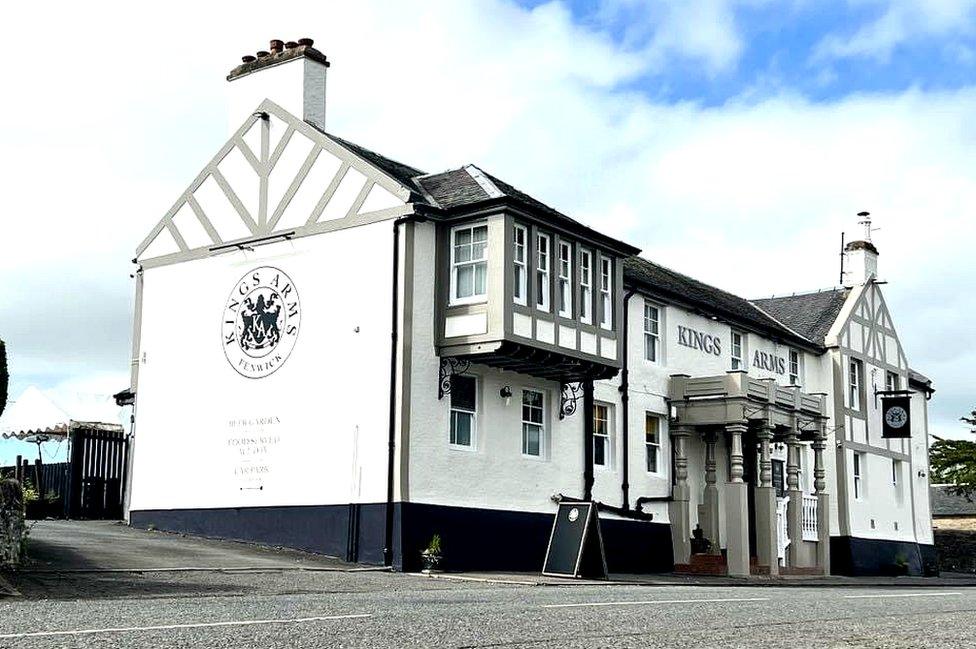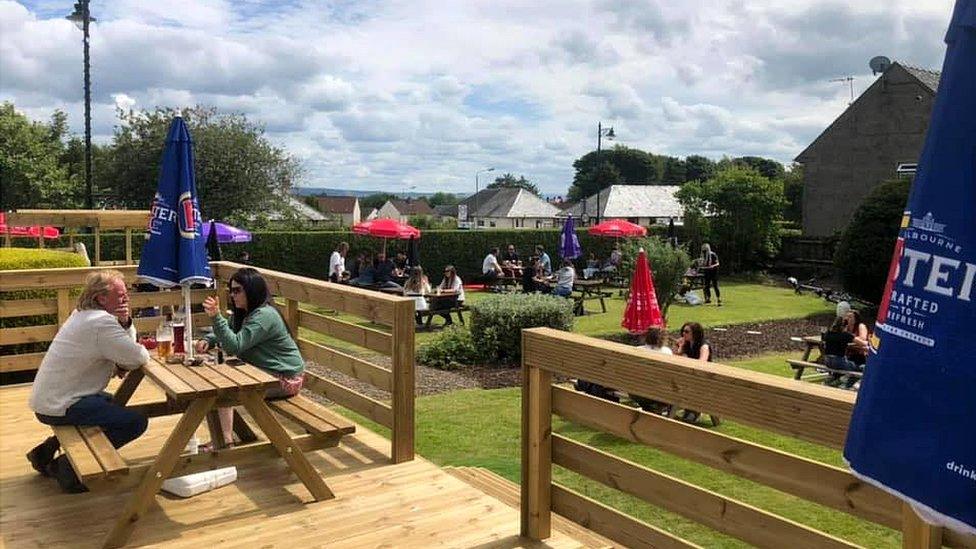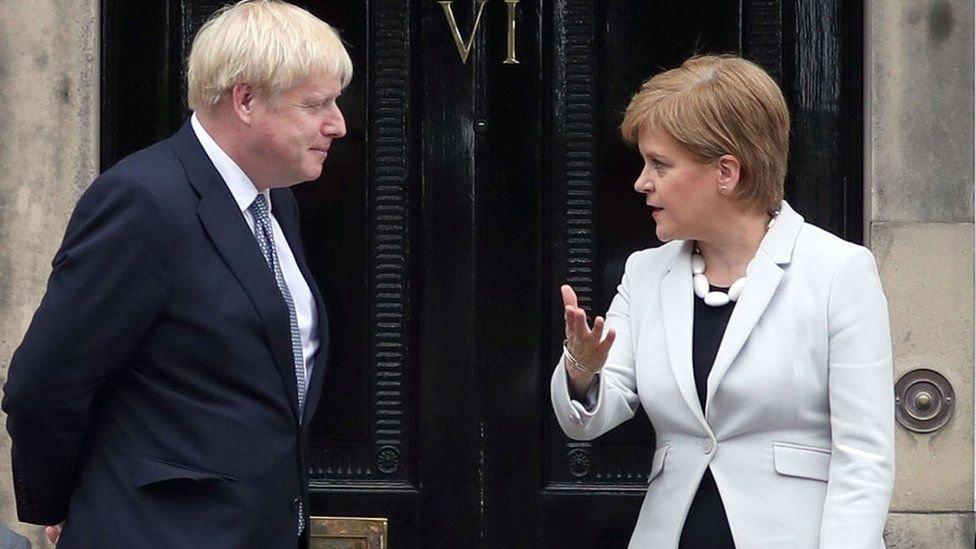Energy crisis is worse than Covid - pub owner
- Published

Gareth Kelly and Mikey Lennon, owners of the Kings Arms in Fenwick, have tried to shield customers from price rises
The spiralling cost of energy is worse than the Covid pandemic for the hospitality industry, according to one Scottish pub owner.
Mikey Lennon said his electricity bill for the King's Arms in Fenwick, East Ayrshire, has risen from £960 a month to more than £3,300.
The gas bill has jumped by £1,200 in the last three months.
Without immediate government action, he fears businesses like his will be forced to turn off the lights for good.
It came as consumer expert Martin Lewis warned that the situation with domestic energy bills was a "national crisis" on the scale of the Covid pandemic.
Mr Lennon told BBC Radio Scotland's Good Morning Scotland that trying to shield customers from price rises was pushing his business to the brink.
"We have absorbed a lot of the cost ourselves trying to not put prices up and push rises on to customers, but with the current climate we find it increasingly hard," he said.
"It is already apparent it is more difficult than Covid. We thought that was going to be the worst thing that was ever going to happen to the hospitality industry.
"In the pandemic, there was a lot of support, funding and grants to get our industry through Covid and right now there is nothing - not even the right conversations happening from the right people.
"There is no price cap for commercial units' utilities and we can't see where it is going to stop."
The pub is the hub of the village of 1,500 people and Mr Lennon and co-owner Gareth Kelly feel that pulling the shutters down on the only place to meet would be devastating.
"This can't continue," said Mr Lennon. "The sad truth is that businesses are going to be pushed under if these costs don't get under control very quickly."

Colin Wilkinson, the managing director of the Scottish Licenced Trade Association, has called for the introduction of an energy price cap for commercial businesses.
He said: "We are deeply concerned. Many businesses are saying this is worse because there is no financial support as there was with Covid. That wasn't enough, but it was something.
"We are hearing talk of businesses closing over winter. Energy bills are increasing threefold.
"They are trying to absorb it, and are conscious that customers are also looking at a severe reduction in disposable income.
"We need a price cap for commercial businesses, and a realistic cap for commercial rates. The government needs to support businesses through this."
The Scottish government said ministers were in regular dialogue with business organisations and leaders who had made clear that the high cost of doing business in the UK was "significantly hampering" their ability to recover from the pandemic.
A spokeswoman added: "We support the calls from businesses for measures related to energy prices, VAT reduction, staff shortages and handling business loans, direct support which falls within the reserved responsibilities of the UK government.
"Without action from UK ministers, an overall rise in business failures is to be expected and the Scottish government urges them to take immediate action on the interventions requested by businesses."

The Kings Arms is the hub of Fenwick village and is where locals meet up
Earlier this week, First Minister Nicola Sturgeon wrote to Boris Johnson to request an "emergency meeting" over the cost of living crisis.
She told the prime minister only the UK government could access resources "on the scale required".
The UK government said in May that oil and gas companies would be taxed an additional 25% for the next 12 months to help households with rising bills.
However Boris Johnson has said he has no plans to introduce a windfall tax on the profits of electricity firms before he steps down as prime minister.
The UK government said Scotland had been granted record funding levels.
- Published8 August 2022

- Published2 August 2022
